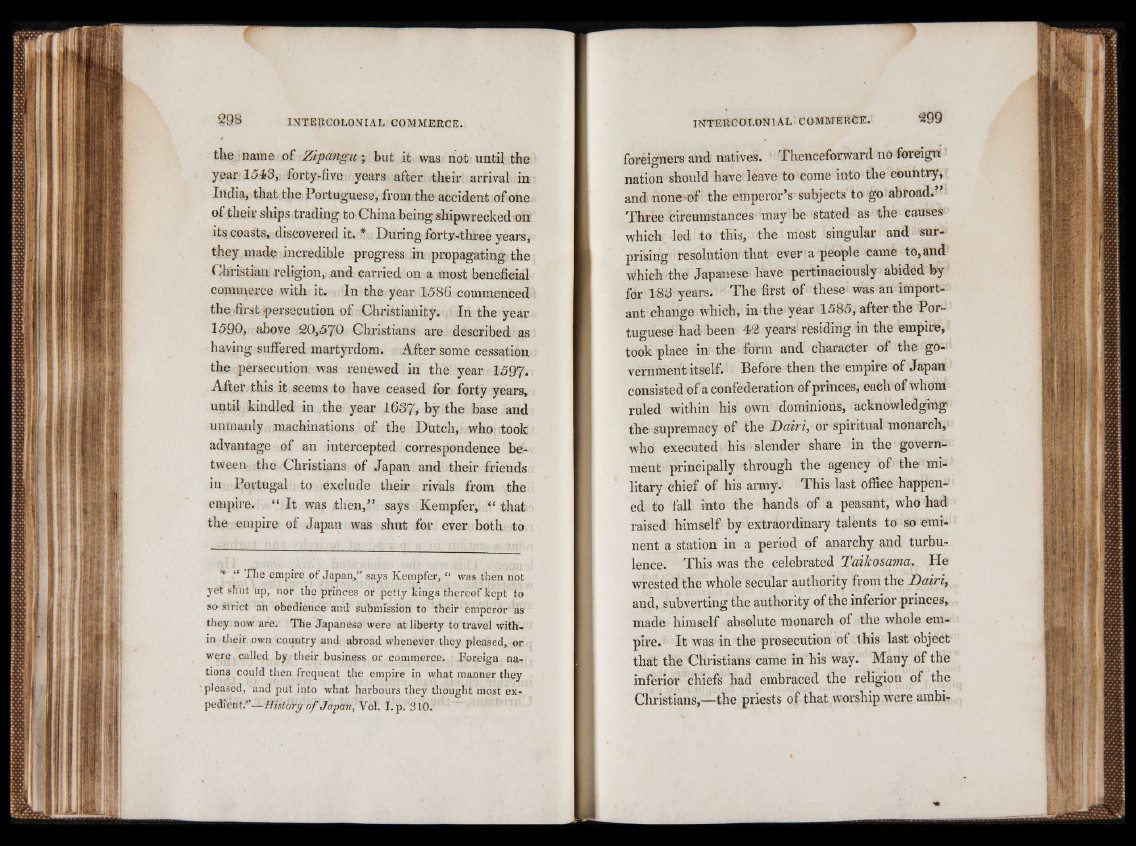
the name of Zipangu; but it was not until the
year 1513, forty-five years after their arrival in
9 . e Portuauese, from the accident of one
of their ships trading to China being shipwrecked on
its coasts, discovered it. * During forty-three years,
they made incredible progress in propagating the
Christian religion, and carried on a most beneficial
commerce with it. In the year 1586 commenced
the -first -persecution of Christianity. In the year
1590, above 20,570 Christians are described as
having suffered martyrdom. After some cessation
the persecution was renewed in the year 1597.
After this it seems to have ceased for forty years,
until kindled in the year 1637, by the base and
unmanly machinations of the Dutch, who took
advantage of an intercepted correspondence between
the Christians of Japan and their friends
in Portugal to exclude their rivals from the
empire. “ It was then,” says Kempfer, <e that
the empire of Japan was shut for ever both to
* “ The empire of Japan,” says Kempfer, n was then not
yet shut up, nor the princes or petty kings thereof kept to
so Strict an obedience and submission to their emperor as
they now are. The Japanese were at liberty to travel within
their own country and abroad whenever they pleased, or
were called by their business or commerce. Foreign nations
could then frequent the empire in what manner they
pleaised, and put into what harbours they thought most expedient.”—
History of Japan, Vol. I. p. 3 10.
foreigners and natives. Thenceforward no foreign
nation should have leave to come into the country,
and nonemf the emperor’s subjects to go abroad.”
Three circumstances may be stated as the causes
which led to this, the most singular and surprising
resolution that ever a people came to, and
which the Japanese have pertinaciously abided by
for 183 years. The first of these was an important
change which, in the year 1585, after the Portuguese
had been 42 years residing in the empire,
took place in the form and character of the government
itself. Before then the empire of Japan
consisted of a confederation of princes, each of whom
ruled within his own dominions, acknowledging
the supremacy of the Dairi, or spiritual monarch,
who executed his slender share in the government
principally through the agency of the military
chief of his army. This last office happened
to fall into the hands of a peasant, who had
raised himself by extraordinary talents to so eminent
a station in a period of anarchy and turbulence.
This was the celebrated Taikosama. He
wrested the whole secular authority from the Dairi,
and, subverting the authority of the inferior princes,
made himself absolute monarch of the whole empire.
It was in the prosecution of this last object
that the Christians came in his way. Many of the
inferior chiefs had embraced the religion of the
Christians,—the priests of that worship were ambi